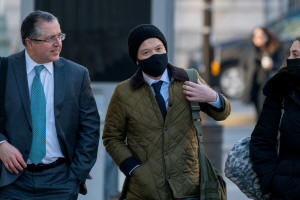|
Roger Ng, Goldman's former investment banking chief in Malaysia,
will be the first - and likely only - person to stand trial in
the United States over one of the biggest financial scandals in
Wall Street history.
Ng's former boss, Timothy Leissner, pleaded guilty in 2018 to
money laundering and corruption charges, while a Goldman
subsidiary in 2020 pleaded guilty to conspiring to violate an
anti-bribery law.
Ng has pleaded not guilty to three counts of conspiring to
launder money and violate an anti-bribery law. Opening
statements are scheduled for Monday in federal court in
Brooklyn.
Prosecutors say Ng and Leissner evaded Goldman's internal
compliance protocols. But Ng's lawyers say he had no role in the
crimes and that Leissner falsely implicated him in an effort to
reduce his punishment. Leissner, Goldman's former Southeast Asia
chairman, has not yet been sentenced.
Legal experts said Ng faces tough odds since prosecutors will
likely show the jury emails and online chats indicating his
involvement, as well as financial records showing he benefited
from the scheme. They are also expected to call Leissner as a
witness.
"They have a bit of a mountain to climb especially since his
boss has turned on him and will provide the testimony necessary
to link him into the conversations, the actions, the strategy
which facilitated the criminal act," said Michael Weinstein, a
white-collar criminal defense lawyer at Cole Schotz PC and a
former federal prosecutor.
The charges against Ng, 50, are related to some $4.5 billion
U.S. prosecutors say was embezzled between 2009 and 2014 from
1Malaysia Development Berhad, a fund launched in 2009 by
Malaysia's former prime minister, Najib Razak, to spur economic
growth.
During that period, prosecutors say, Goldman earned $600 million
in fees for helping 1MDB sell $6.5 billion in bonds. But Ng,
Leissner, and a Malaysian intermediary named Jho Low conspired
to pay $1.6 billion in bribes to officials in Malaysia and Abu
Dhabi to win the business for Goldman, according to prosecutors.
Low has not been arrested by U.S. or Malaysian authorities.
Malaysia says Low is in China, which Beijing has denied.
Goldman Sachs in 2020 paid a $2.3 billion fine, returned $600
million in ill-gotten gains and agreed for its Malaysian
subsidiary to plead guilty in U.S. court as part of a deal,
known as a deferred prosecution agreement (DPA), with the
Department of Justice.
Ng's lawyers acknowledge he introduced Low to Leissner, but say
he had no further role in the scheme and later warned his
superiors at Goldman that Low was "not to be trusted," a
November 2020 court filing shows.
"He just wasn't involved with Leissner and Low and a host of
other people in this stunningly massive series of crimes," said
Marc Agnifilo, a lawyer for Ng, describing his client as a "fall
guy."
Agnifilo said financial inflows that Ng received that
prosecutors call ill-gotten gains had nothing to do with 1MDB.
'INSTITUTIONAL FAILURES'
The long-running scandal, which came to light in 2015, has had
far-reaching consequences and led to widespread public outcry in
Malaysia. Najib, who was voted out of office in 2018, is accused
by Malaysian authorities of receiving more than $1 billion
traceable to 1MDB. Najib, who has appealed a 12-year prison
sentence, has consistently denied wrongdoing.
At least six other countries, including Singapore and
Switzerland, have launched investigations into 1MDB's dealings.
But after reaching the DPA in 2020, Goldman itself is unlikely
to face any material damage from Ng's trial, said Odeon Capital
analyst Dick Bove. Chief Executive David Solomon has revived the
bank's fortunes since his appointment as CEO in October 2018,
delivering record annual profit in 2021.
"No one is going to come after David Solomon over what this guy
did in Malaysia years ago," Bove said. "I'm sure that there will
be a lot of incendiary information that comes out, but from the
standpoint of Wall Street, these pieces of information will be
nothing but an embarrassment and annoyance."
While Solomon in 2018 blamed the scandal on employees who "broke
the law" and said the company's compliance was strong, he said
at the time of the October 2020 settlement that there were
"institutional failures" at the bank.
That shift could make it hard for Ng to argue he is simply a
scapegoat, said former federal prosecutor Bruce Searby.
The argument "doesn't take any responsibility away from Roger
Ng," said Searby, now a white-collar defense lawyer in
Washington, D.C.
(Reporting by Luc Cohen in New York; Additional reporting by
Matt Scuffham in New York; Editing by Noeleen Walder and Matthew
Lewis)
[© 2022 Thomson Reuters. All rights
reserved.]
Copyright 2022 Reuters. All rights reserved. This material may not be published,
broadcast, rewritten or redistributed.
Thompson Reuters is solely responsible for this content.

|
|





